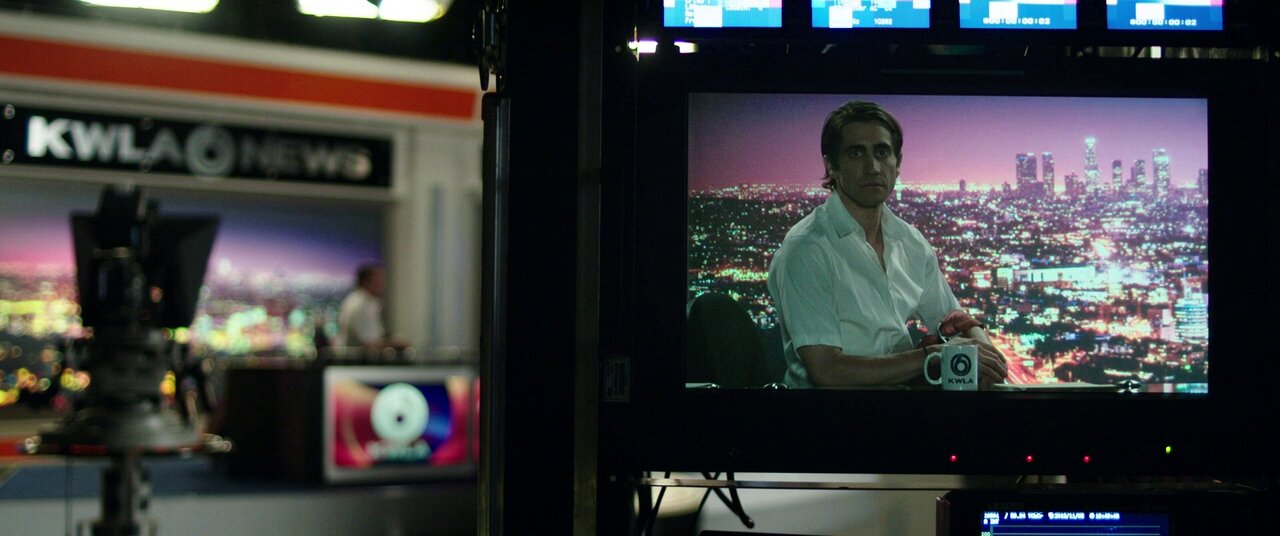Nightcrawler (dir. Dan Gilroy, 2014)- Review
Download the Nightcrawler screenplay for personal, private use.
“The whole point of television,” ruminated Susan Sontag in 2003’s Regarding the Pain of Others, “is that … it is normal to switch channels, to become restless, bored. Consumers droop. They need to be stimulated, jump-started, again and again. Content is no more than one of these stimulants.”
In turn, the gaunt, puppy-eyed protagonist of Nightcrawler (2014) is no more than a content purveyor of TV news, a regular guy descending to ever ghastlier depths, not at the behest of conventional incentives such as love, revenge, or fear, but of modern hustle culture. Jake Gyllenhaal’s Lou Bloom works as a ’stringer’, or freelance cameraman, hunting down the grisliest crime scenes in LA to shoot, sell, and even, perhaps, stage.
Despite his amorality, Bloom retains a disconcerting appeal, railing off corporate jargon, extracts from self-help books, and clumsy pick-up lines with the same childlike sincerity that drives his impassive exploitation of suffering. “It’s important that you feel like Lou is the superhero of a generation,” said Gyllenhaal in a 2014 Guardian interview. “People have asked me throughout many interviews over time: ‘Do you ever wish you’d played a superhero?’ I just did – his name is Lou Bloom.”
Writer-director Dan Gilroy’s dive into the churning depths of the twenty-first century news content deluge has already taken on a patina of antiquity in the seven years since its release: both the technological and the psychological processes in the race for the story have developed, yet remain recognisable. Eschewing the wide-shot industry portrait of genre classics like Network or All The President’s Men, Gilroy’s envisioning of mid-2010s LA newsmaking is seen, literally, through Lou. “I’m focusing on framing,” Lou explains, spattered in the blood of his latest subject. “A proper frame not only draws the eye into a picture but keeps it there longer, dissolving the barrier between the subject and the outside of the shot.” Lou, as both framer and framing device, becomes medium, creator and object of the narratives which he peddles, and the narrative of the film.
Like the LA setting, the plot bursts with colourful characters and diversions, yet their multitude reinforces a deep sense of isolation as the audience becomes increasingly emotionally estranged from each. Only two main characters emerge alongside Lou: his station boss, Nina (Rene Russo) and his underling, Rick (Riz Ahmed). The rest pass, like Lou’s subjects, in a forgettable and anonymous flurry of lurid encounters.
The film introduces Lou with a barrage of non-sequiturs. The gaunt 30 year old—“disconnected ... feral ... driven by dollar signs and a dream of some imagined Eden” — steals chain link, fights a security guard, and reels off a long, robotically ardent citation of the hustler credo — to the buyer of his stolen scrap. “I know that today’s work culture no longer caters to the job loyalty that could be promised to earlier generations. What I believe, sir, is that good things come to those who work their asses off.” This overture establishes both the disturbing innocence and the comic setup of Lou’s unwavering conformity to the hollow rhetoric of the American Dream: the sitcom trope of the quizzical savant, á la Sheldon from Big Bang Theory, is a key element of Lou’s modality.
Gilroy neatly depicts how the socially laudable ‘hustler’ mentality, and modern capitalism, are not only compatible with but conducive to inhuman acts. Lou connects the ideology with actions by following the logical route between both, eerily earnest as he descends into amorality. Nina — “a 50-ish, over-made, hard-bitten beauty who began in front of the camera and has now… become the madam of the whore house” — initiates him from innocence into depravity. “To capture the spirit of what we air,” she tells him, “think of our newscast as a screaming woman running down the street with her throat cut.”
Lou takes her advice as fervently as that of his online business courses and self-help books, producing an ugly synthesis of American values. When Rick discourages him from filming a dead cameraman — “one of us” — Lou tells him that “we’re professionals, Rick. He’s a sale.” The fate of the cameraman, and later Rick, reminds the audience that everyone — from Lou and Nina, to the viewer — is intertwined in the self-cannibalising media ecosystem.
Áine Kennedy is a London-based writer and manager of the ScriptUp blog.







